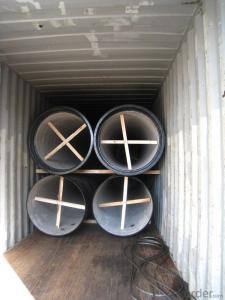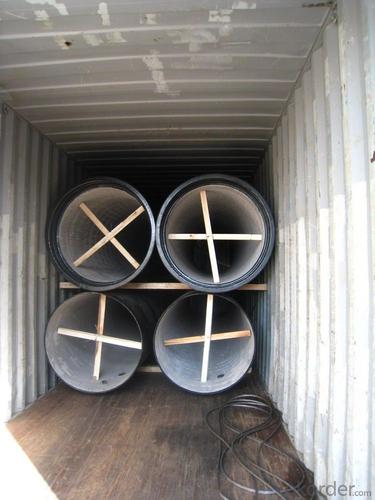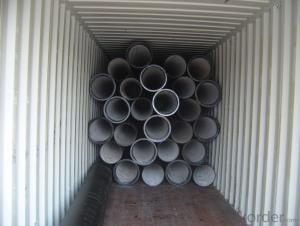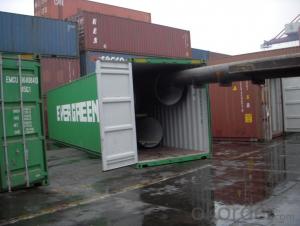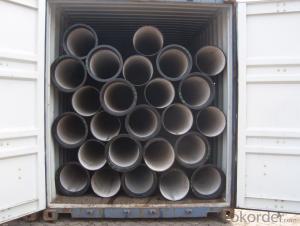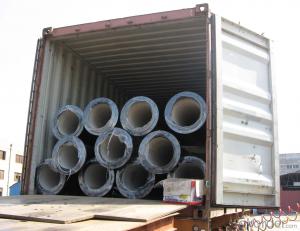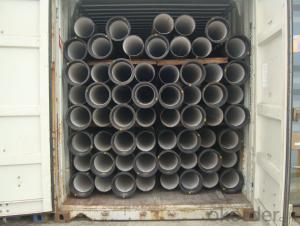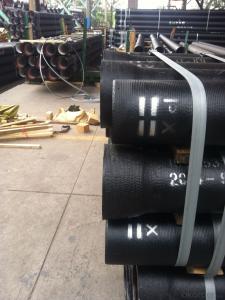DUCTILE IRON PIPES AND PIPE FITTINGS K8 CLASS DN1400
- Loading Port:
- Tianjin
- Payment Terms:
- TT OR LC
- Min Order Qty:
- 22 pc
- Supply Capability:
- 3000 pc/month
OKorder Service Pledge
OKorder Financial Service
You Might Also Like
Material : Ductile Cast Iron
Size Range : DN 80mm to DN 2000mm
Unit Effective Length : 6m or 5.7m
Manufacture Standard: ISO 2531:1998/ EN 545:2006/EN 598:2007
Annual capacity : 200,000 tons
Coating Exterior: Zinc 130g/m2 according to ISO 8179-1 and bitumen coating 70 microns.
Cement Interior: Portland Cement/ High Alumina Cement/ Sulphate Resisting Cement Lining according to ISO 4179
Special requirements on external coating and internal lining can be applied
We also provide accessories such as SBR/EPDM rubber gaskets, lubricant paste, pipe caps, PE sleeves, etc.
Additional Parts:
Each pipe is strictly inspected according to related standard to ensure permanently high performance.
Easy Installation at site and service free for life
Long Service Lifespan
Quotation will arrive you within 24hours once we get your inquiry.
We guarantee offering you a competitive price.
A copy of original inspection reports of pipes will be offered after shipment.
Photos of loading process will be sent to the customer after shipment effect.
We will follow-up the delivery progress after shipment effect and update to the customer on weekly basis.
- Q: It's not easy to drill ductile iron with cobalt high speed steel bit. Please help to point it out
- Choose carbide or whole carbide drill, about 90HRC in hardness. But it requires a high number of drills, around 3000.
- Q: Are ductile iron pipes resistant to alkali attacks?
- Ductile cast iron, commonly used in ductile iron pipes, has demonstrated its remarkable resistance to alkali attacks. This is achieved through the inclusion of specific chemical compositions that provide exceptional corrosion resistance. Alkali attacks, which arise from the interaction between alkaline substances and metals or other materials, are effectively countered by the dense and protective oxide film present on both the inner and outer surfaces of ductile iron pipes. This oxide film forms naturally over time and possesses a composition and structure that offer excellent resistance to alkali attacks. Moreover, to further enhance their ability to withstand corrosion and chemical reactions, ductile iron pipes are frequently coated with various protective layers, such as epoxy or zinc. It should be emphasized that although ductile iron pipes exhibit a high resistance to alkali attacks, the severity and concentration of the alkali substances can still impact their overall performance. In extreme instances, where there are exceedingly high concentrations of alkali substances or prolonged exposure to aggressive alkaline environments, some damage may occur to the protective layers of the pipes. Nonetheless, within normal conditions and acceptable parameters, ductile iron pipes are widely regarded as possessing outstanding resistance to alkali attacks.
- Q: What are the typical joint restraint requirements for ductile iron pipes?
- The typical joint restraint requirements for ductile iron pipes include the use of mechanical joint restraints or push-on joint restraints. These restraints are necessary to prevent the pipe from separating or pulling apart under various operating conditions, such as internal pressure, external loads, and ground movement. Mechanical joint restraints are commonly used in applications where the pipe is subjected to high internal pressures or external loads. They typically consist of a gland and a follower gland, which are tightened around the pipe joint using bolts or clamps. This helps to secure the joint and prevent any movement or separation. Push-on joint restraints, on the other hand, are used in applications where the pipe is not subjected to high internal pressures or external loads. These restraints are designed to provide a seal and prevent the pipe from pulling apart due to ground movement or other external forces. They are installed by pushing the pipe into the joint and securing it with a restraining ring or collar. In addition to these joint restraints, it is also important to consider the bedding and backfill requirements for ductile iron pipes. Properly compacted and supportive bedding and backfill materials help to distribute the loads and provide stability to the pipe system, further enhancing its resistance to joint separation. It is worth noting that the specific joint restraint requirements for ductile iron pipes may vary depending on the project specifications, pipe size, and operating conditions. Therefore, it is important to consult the manufacturer's recommendations and engineering standards to ensure the proper selection and installation of joint restraints for ductile iron pipes.
- Q: Are ductile iron pipes suitable for use in mining applications?
- Yes, ductile iron pipes are suitable for use in mining applications. They possess excellent strength, durability, and resistance to corrosion, making them ideal for transporting fluids and materials in the harsh and demanding conditions of mining operations. Additionally, their ductility enables them to withstand high pressures and impacts, ensuring reliable performance and long service life in mining environments.
- Q: How do ductile iron pipes perform in extreme weather conditions?
- Ductile iron pipes are renowned for their outstanding performance when faced with harsh weather conditions. Crafted from an iron alloy infused with small quantities of carbon and other elements, these pipes exhibit unparalleled strength and resilience, rendering them highly impervious to the effects of extreme weather. In soaring temperatures, ductile iron pipes maintain their structural integrity without succumbing to softening or deformation, unlike certain other materials. This ensures that the pipes continue to function optimally and reliably, even in scorching heat. Furthermore, these pipes boast a remarkable resistance to thermal expansion, thereby minimizing the risk of pipe distortion or joint failure during temperature fluctuations. When confronted with frigid conditions, ductile iron pipes also excel. They possess a low coefficient of thermal expansion, translating to a reduced likelihood of cracking or fracturing due to freezing temperatures. Moreover, their robustness and flexibility enable them to withstand the pressure exerted by freezing water inside the pipes without incurring significant damage. In addition, ductile iron pipes exhibit superb corrosion resistance, demonstrating their ability to withstand the detrimental effects of harsh chemicals, saltwater, and other corrosive substances that may be present in extreme weather conditions. This corrosion resistance ensures the longevity and dependability of the pipes, preventing leaks and preserving water quality. In terms of durability, ductile iron pipes are designed to endure heavy loads and external stresses. Boasting high tensile strength, they display resistance to bending and breakage. This characteristic proves crucial in extreme weather conditions where heavy rainfall, powerful winds, or even seismic activities may occur. All in all, ductile iron pipes have a well-established reputation for delivering exceptional performance in extreme weather conditions. Their strength, resilience, thermal stability, corrosion resistance, and durability render them a reliable choice for a multitude of applications, including water supply, sewage systems, and industrial pipelines, even in the most challenging weather environments.
- Q: How many degrees can the ductile iron pipe be each?
- Although ductile iron has a certain plasticity, it should not be bent in use
- Q: What are the interface forms of ductile iron pipes? The best drawings are available. Thank you
- There are many kinds of ductile iron pipe interfaces, and the T type interface (sliding type) flexible interface is famous for its fast installation and simple installation.
- Q: What is the typical weight of ductile iron pipes?
- The weight of ductile iron pipes can differ according to their size and thickness. Nonetheless, as a broad reference, smaller diameter pipes typically weigh around 1 pound per foot, while larger diameter pipes can weigh several hundred pounds per foot. The weight of ductile iron pipes is influenced by factors like the dimensions of the pipes, the thickness of their walls, and the particular requirements of the intended use. It is essential to acknowledge that these weights are approximate and subject to variation depending on the manufacturer and product specifications.
- Q: How are ductile iron pipes protected against stray electrical currents?
- To safeguard water and sewer systems, ductile iron pipes are shielded from stray electrical currents through a technique called cathodic protection. This process entails the application of a low-voltage direct current (DC) to the pipes, generating a defensive electrical field around them. To achieve cathodic protection, sacrificial anodes or impressed current systems are installed near the ductile iron pipes. Sacrificial anodes, composed of a more electrically active metal like zinc or magnesium, are connected to the pipes and act as the electrical current source. Over time, these anodes corrode, sacrificing themselves to shield the pipes from corrosion caused by stray electrical currents. However, impressed current systems utilize an external power source to supply the protective electrical current. Rectifiers are employed to convert alternating current (AC) to direct current (DC), which is then administered to the pipes through anodes. This approach provides greater control over the amount of current applied, ensuring optimal protection. In both scenarios, the electrical current flowing through the sacrificial anodes or impressed current systems establishes a protective barrier around the ductile iron pipes. This barrier impedes the flow of stray electrical currents through the pipes, thus diminishing the risk of corrosion and prolonging the infrastructure's lifespan. Regular monitoring and maintenance of the cathodic protection system are crucial to uphold its efficacy. This involves inspecting the anodes, assessing the levels of electrical current, and making any necessary adjustments or replacements to maintain the desired level of protection. To summarize, cathodic protection is a dependable and widely utilized method for safeguarding ductile iron pipes against stray electrical currents. By preserving the integrity and longevity of water and sewer systems, it plays a vital role in ensuring their functionality.
- Q: Can ductile iron pipes be used for underground river crossings?
- Yes, ductile iron pipes can be used for underground river crossings. Ductile iron pipes are known for their strength and durability, making them suitable for various applications including underground river crossings. These pipes have a high tensile strength and can withstand the external loads and pressures exerted by the surrounding soil and water. Additionally, they have excellent corrosion resistance, which is crucial when dealing with underground water sources like rivers. Ductile iron pipes are also capable of withstanding ground movements, settling, and other geological challenges that may occur during the installation and operation of underground river crossings. Therefore, they are a reliable choice for ensuring the safe and efficient transportation of water across rivers while maintaining the integrity of the underground infrastructure.
Send your message to us
DUCTILE IRON PIPES AND PIPE FITTINGS K8 CLASS DN1400
- Loading Port:
- Tianjin
- Payment Terms:
- TT OR LC
- Min Order Qty:
- 22 pc
- Supply Capability:
- 3000 pc/month
OKorder Service Pledge
OKorder Financial Service
Similar products
Hot products
Hot Searches
Related keywords
